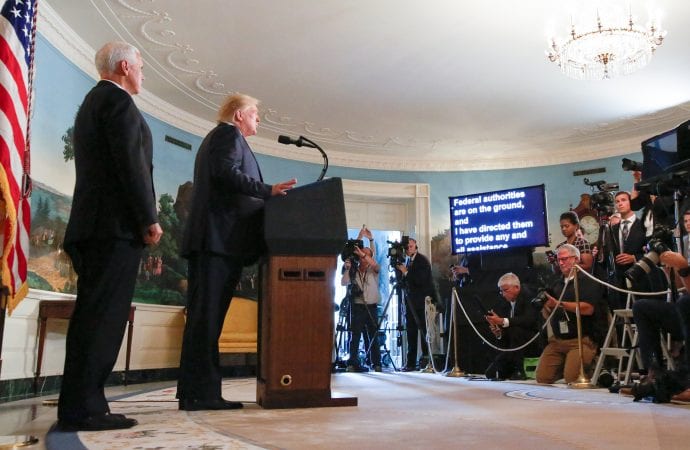Following back-to-back gun massacres that left 31 dead in Texas and Ohio, Bishop Mark Seitz of El Paso said it was “appropriate” for President Donald Trump to call out the white supremacy that motivated the Texas shooting, but said the president must also examine his own rhetoric in the matter.
In his remarks from the White House on Monday morning, the president called for the nation to “condemn racism, bigotry and white supremacy” and labeled the weekend’s attacks as “evil.”
The president called for bipartisan efforts to combat gun violence, while focusing much of his ten-minute address to lamenting “the perils of the internet and social media.”
In an interview with Crux following those remarks, Seitz said that the president should “examine himself and the kind of rhetoric that contributes to the hatred of a whole group of people.”
Prior to beginning his rampage, the Texas gunman posted an online manifesto ranting against immigrants and making other racist remarks.
Seitz criticized language that condemns “a whole group of people and an attitude toward them,” adding that all Christians have a duty to examine their language and behavior.
“We all need to ask ‘how do I communicate? How do I respond to other people with whom I disagree? Do I attack them as a person?’” Seitz said.
In response to the president’s remarks on Monday, Richard Coll, director of the office of Domestic Social Development at the United States Conference of Catholic Bishops (USCCB), told Crux that the U.S. bishops would welcome a “good faith, bipartisan outreach to address in specific terms proposals to reduce gun violence.”
Since the 1990s the U.S. bishops have advocated for a comprehensive approach to reducing gun violence, which includes tighter gun control laws that include a ban of assault rifles, heightened security screenings and background checks, and improved mental health care.
Coll emphasized that the assault weapons ban, which was in place for a decade before expiring in 2004, was a centerpiece of the U.S. bishops’ proposals.
Both Seitz and Coll criticized the president’s proposal on Monday that the Department of Justice propose legislation calling for the death penalty for “those who commit hate crimes and mass murders.”
Seitz said that “violence just leads to more violence,” adding that the Catholic Church’s teaching that human life is sacred is “consistent from the beginning of a person’s existence until God calls them home.”
The president’s death penalty proposal comes less than one month after his administration announced it would resume executing federal death row inmates after a nearly two decade moratorium - a move that was widely criticized by Catholic leaders.
Krisanne Vaillancourt Murphy, Executive Director of the Catholic Mobilizing Network against the Death Penalty, told Crux that the president’s suggestion of implementing the death penalty in response to the gun massacres is “wrong-headed.”
“The trauma brought to bear on the families, loved ones, and communities from this weekend’s tragic mass shootings in El Paso and Dayton is staggering. Yet President Trump’s suggestion to accelerate the use of the death penalty is wrong-headed,” she said.
“If our country is to confront violence, it needs to seek ways to promote human dignity, foster healing, and repair harm,” she continued. “It is misguided to respond to shameful, cowardly acts of violence with more senseless violence. The death penalty only perpetuates a culture of death instead of the culture of life we so desperately need.”
More than 38,000 individuals in the United States die from guns each year, and in 2015, when Pope Francis spoke to a joint session of the U.S. Congress, he specifically called out the arms trade.
“Why are deadly weapons being sold to those who plan to inflict untold suffering on individuals and society? Sadly, the answer, as we all know, is simply for money: Money that is drenched in blood, often innocent blood,” he said in an address in which he also called for a total ban of the death penalty.
In response to this past weekend of gun violence, Loyola University Chicago theologian Therese Lysaught proposed that the U.S. bishops launch a “gun amnesty collection” in every Catholic parish across the country.
On Twitter, Lsyaught said it would serve as a “witness to Catholic teaching and its commitment to exercise concrete leadership in solving this violent social disease rooted in idolatry and racism.”
In 2019, the USCCB has issued six statements related to gun violence - the last three of which were issued in less than a one-week period.

